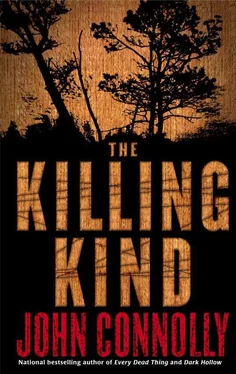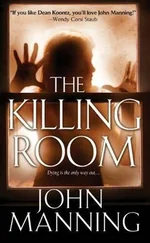“I know where they are, Rachel. They're in Lubec.”
Her voice had tightened a notch when she spoke again. “Then you take care.”
“I always take care,” I replied.
“No, you don't.”
“I guess not, but I mean it this time.”
I was just beyond Bangor. Lubec was about another 120 miles away along U.S. 1. I could do it in less than two hours, assuming no eagle-eyed lawman decided to haul me over for speeding. I put my foot on the gas and felt the Mustang surge forward.
Louis called when I was passing Ellsworth Falls, heading down 1A to the coast.
“I'm in Waterville,” he said.
“I think they're in Lubec,” I replied. “It's on the northern coast, close to New Brunswick. You've a ways to go yet.”
“They call you?”
“Nothing.”
“Wait for me at the town limits,” he replied. His tone was neutral. He could have been advising me not to forget to pick up milk.
At Milbridge, maybe eighty miles from Lubec, the cell phone rang for the third time. This time I noticed that the ID of the caller was concealed as I pressed the answer button.
“Mr. Parker,” said Pudd's voice.
“Is he alive?”
“Barely. I'd say hopes for his recovery are fading fast. He seriously injured my associate.”
“Good for him, Leonard.”
“I couldn't let it go unpunished. He bled quite a lot. In fact, he's still bleeding quite a lot.” He snickered unpleasantly. “So you've worked out our little family tree. It's not pretty, is it?”
“Not particularly.”
“You have the book?” He knew that Lutz had failed. I wondered if he knew why and if the shadow of the Golem was already almost upon him.
“Yes.”
“Where are you?”
“Augusta,” I said.
I could have cried with relief when he seemed to believe me.
“There's a private road off Route 9, where it crosses the Machias River,” said Pudd. “It leads to Lake Machias. Be at the lakeshore in ninety minutes, alone and with the book. I'll give you whatever is left of your friend. If you're late, or if I smell police, I'll skewer him from his anus to his mouth like a spit pig.” He hung up.
I wondered how Pudd planned to kill me when I reached the lake. He couldn't let me live, not after all that had taken place. And ninety minutes wasn't enough time to reach Machias from Augusta, not on these roads. He had no intention of bringing Angel there alive.
I called Louis. It was a test of trust, and I wasn't certain how he would respond. I was closest to Lubec; there was no way that Louis could get there before Pudd's deadline ran out. If I was wrong about Lubec, then somebody would have to be at the rendezvous point to meet him. It would have to be Louis.
The pause before he agreed was barely detectable.
THREE WOODEN LIGHTHOUSES decorated the sign at the outskirts of the town of Lubec: the white-and-red Mulholland Light across the Lubec Channel in New Brunswick; the white Lubec Channel Light, a spark-plug-style cast-iron structure out on the Lubec Channel; and the red-and-white-striped West Quoddy Light at Quoddy Head State Park. They were symbols of stability and certainty, a promise of safety and salvation now potentially corrupted by the stain of the Faulkners' presence.
After a brief stop at the edge of the town, I drove on, past the boarded-up frame of the old Hillside Restaurant and the white American Legion building, until I came to Lubec itself. It was a town filled with churches: the White Ridge Baptists, the First Assembly of God, the Seventh Day Adventists, the Congregational Christians, and the Christian Temple Disciples had all converged at this place, burying their dead in the nearby town cemetery or erecting memorials to those lost at sea. Grace Peltier had been right, I thought; I had only glanced at the thesis notes Marcy had given me, but I had noted Grace's use of the term “frontier” to describe the state of Maine. Here, at the easternmost point of the state and the country, surrounded by churches and the bones of the dead, it was possible to feel that this was the very end of things.
On the waterfront, seabirds sat on the dilapidated pier, its walkway sealed off with Private Property notices. There was a stone breakwater to the left, and to the right, a congregation of buildings, among them the old McMurdy's Smokehouse, which was in the process of being restored. Across the water, the Mulholland Light was visible, the FDR Memorial Bridge extending toward it across the water of the Lubec Narrows.
It was already growing dark as I drove up Pleasant Street, the waterfront on my left, to a dirt lot beside the town's wastewater treatment facility. From there, a small trail led down to the shore. I followed it, stepping over seaweed and rocks, discarded beer cans and cigarette packs, until I stood on the beach. It was mainly stones and marram grass, with some gray sand exposed. Beyond, the Lubec Channel Light scythed through the failing evening light.
Maybe half a mile to my right, a stone causeway reached into the sea. At the end was a small island covered in trees, their branches like the black spires of churches set against the lighter tones of the evening sky. A dull green light shone between the branches in places, and I could see the brighter white lights of an outbuilding close to the northern side of the island.
There were three lighthouses on Lubec's sign, for only three lighthouses were still in existence. But there had once been another: a stone structure built on the northern shore of the Quoddy Narrows by a local Baptist minister as a symbol of God's light as well as a warning to mariners. It was a flawed, imperfect structure, and had collapsed during a heavy gale in 1804, killing the minister's son who was acting as lighthouse keeper. Two years later, concerned citizens nominated West Quoddy Head, farther down the coast, as a more suitable position, and in 1806 Thomas Jefferson had ordered the construction of a rubblestone lighthouse on the spot. The Northern Light was largely forgotten, and now the island on which it lay was in private ownership.
All of this I learned from a woman in McFadden's variety store and gas station on the way into town. She said the people on the island kept themselves pretty much to themselves, but they were believed to be religious folk. There was an old man who took ill sometimes and had to be treated by the doctor in town, and two younger people, a man and a woman. The younger man shopped in the store sometimes, but always paid with cash.
She knew his name, though.
He was called Monker.
Ed Monker.
It had begun to rain, a harbinger of the coastal storm that was set to sweep northern Maine that night, and heavy drops hammered on me as I stood watching the causeway. I got back in the car and took the road to Quoddy Head Park until I saw a small, unmarked private drive heading down to the coast. I killed my lights and followed the trail until it petered out among thick trees. I left the car and walked through the grass, using the trees for cover, until the trail ended. Ahead of me was a barred gate with high fencing on either side and a camera mounted on the gatepost. The fence was electrified. Beyond it was a small locked shack in the middle of a copse of pines. I could guess at what was in the shack: an old iron bath with a toilet beside it and the corpses of spiders decaying in the drain.
I took my flashlight from the glove compartment and, shielding the light with my hand, shadowed the fence. I spotted two motion sensors within fifty feet, the grass cropped low around them. I figured there were probably more among the trees themselves. As the rain soaked my hair and skin, I stayed with the fence until I found myself at the top of a steep incline leading back down to the shore. The tide was rolling in and the base of the causeway was now covered in water. The only way to reach the island without getting drenched, or maybe even washed away, was through the gates and along the causeway, but to take that route would be to alert those on the island to my approach.
Читать дальше












